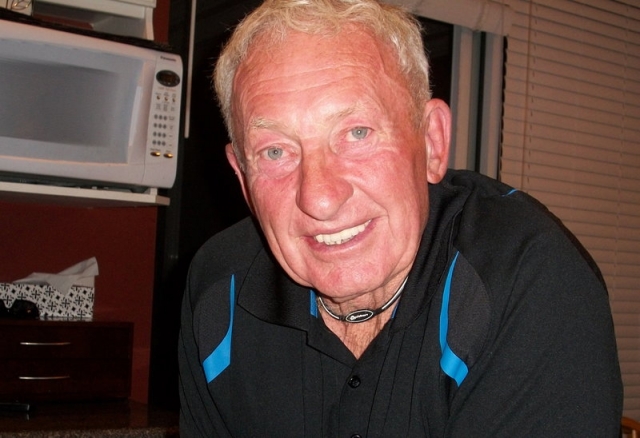A contract review for all city staff and revocation of the Delegation Bylaw? Candidate Lloyd McLellan pulls no punches
NOTE: This, and following, interviews are only slightly edited for clarity and brevity. They consist of the actual words spoken by the candidates, who were not given any opportunity to prepare answers in advance. My intention is to give readers an idea of how well the candidates are able to think on their feet and to express themselves in response to the questions. Readers will no doubt think of other questions — please attend the All-Candidates Forum at the Miners Hall on November 3rd at 7:00 pm, hosted by the Rotary Club, and ask your questions there!
SG: How do you think the relationship between City Council and the CAO and staff should function?
LM: I think Council got into trouble with the Delegation Bylaw. That allowed the CAO extraordinary powers, and they rescinded a lot of policies that were in place in the City. And that caused a problem in that the citizens started to ask, who is really accountable to us? And Council then becomes somewhat redundant, in that they’re not really accountable; and a lot of their answers were, well, the staff advised us, or the CAO did that. And I think that’s really got to be looked at, and rescinded.
SG. Our current CAO seems to be off on indefinite medical leave. We don’t know when we may need to hire a new one, but when we do, how do you think that process should go?
LM: First of all, it has to be an open public competition. And I think Council’s got to be very specific in requiring certain credentials. People filling that position should be well-qualified.
SG: What do you think about the fact that Rossland Council members are among the lowest-paid while senior City staff are among the highest paid for a community of this size?
LM. As for Council positions, I think a nominal amount is very nice. I don’t think you should be out of pocket for expenses, but I think they get enough. As far as the staff go, I haven’t been there for several years, but I’d like to review the contracts, look a the implications of the contracts, and I think one of the things I’d advocate to Council is that we serve notice to these people, that their contracts are not going to be renewed, that there’s going to be an open competition for the positions as soon as we can possibly address it, and that they’re not going to be renewed at the same level of remuneration, because I feel that it’s too high for a city of this size. It’s something we can’t afford.
SG. Speaking of things we can’t afford, there have been studies published showing that infrastructure has been underfunded in cities across Canada and probably worldwide for decades, and it’s been falling into disrepair because we haven’t been maintaining it adequately. How do we strike a balance between taxes that people are willing to pay, and adequate infrastructure?
LM: I think , as in life, you identify priorities, and in a town like Rossland, over a hundred years old, the infrastructure is in disrepair, although the Columbia Avenue work has been addressed, but not in its entirety. They spent over a million dollars on a storm sewer system there, and yet they haven’t mandated for the people on Columbia Avenue to hook up to it.
Now, I know the business people there aren’t making a lot of money. I think one of the things Council can do is give them a couple of years to hook up to it, and maybe give them a break on taxes to help with the cost, because ultimately, when we start paying on the basis of the flow-meters for the sewage treatment, it’s going to be a win-win; it’ll reduce costs to Rossland as a whole. Now, about infrastructure, unfortunately the municipalities are at the mercy of the two senior levels of government, the federal government and the provincial government, and they make grants available to do things that maybe aren’t a priority for the City.
For example, when we did the water treatment plant, we couldn’t get money to upgrade our collection system, but we could get one-third, one-third funding for a water treatment plant. Now, you can’t say “no” to 30-cent dollars, so we built the water treatment plant, when really we still needed improvements to the collection system.. So, we’re at the mercy of the federal government and how they fund, and they’re very political in how they award those grants. So, it’s really a difficult thing.
It’s the same with development. I’m for planned development, but one of the concerns people have is the cost. We don’t want to pay for it; taxes are a major issue. You don’t want to compromise your environment, your city, to achieve development. And in that regard, I think you’ve got to look at the DCC system, and look at increased costs and so on, and upgrade them. You’ve got to be diligent.
SG: Speaking of Development Cost Charges, it’s my understanding that on the advice of the previous CAO, Council did away with them, and we don’t have any right now. What do you think about that?
LM: Well, I think DCCs have to be reintroduced. Like I say, I’m for planned development, but I don’t think the people of Rossland want to pay for that development.
SG: Speaking of development, what’s your opinion on developing outlying areas of Rossland as opposed to infill?
LM: I think infill is more efficient and practical for us.
SG Going back to how Council functions, differences of opinion will always happen. How do you think Council members should deal with opposing arguments from other Council members?
LM: Well, I don’t think differences of opinion are bad. That’s why you want to have different people on Council, from different walks of life. It’s how the differences are presented, and how the people accept a few losses on their positions. For instance, I coexisted with Laurie Charlton on Council for six years, and we had differences of opinion, but we’re still friends. I didn’t personalize the differences.
People shouldn’t attack those who disagree with them, and they should be able to accept not winning all the time. It’s a privilege to be part of Council, and you debate things, and you should debate them at the table, and if you lose the debate, move on.
And here’s another thing: when a person is on Council, I don’t believe they should, after the Council meeting, go and write a letter to the editor, expressing their displeasure with what the Council did, because they’re a part of Council. I think you’ve got an avenue to express your opinion at the Council meetings, and there are people reporting on the meetings, and you’ve had an opportunity to express your views.
SG: Touching on some differing opinions that have come up at Council recently, about design review guidelines. Council debated how closely Council should apply the design review guidelines on signage. The Design Review Committee recommended that the Laundry Dog Laundromat and the Rossland Beer Company should be asked to remove the signs they have put up on the north side of the old Pro Hardware building, so that people driving down Washington can see them. They don’t match. The styles of signage are the ones they have used elsewhere to distinguish their businesses.
LM. You’ve got to sit down and agree on the requirements. Then I think it’s incumbent on Council to listen to the committee. You’ve appointed them, you’ve given them a mandate, although you have final approval. Then if you find that you’re too often at odds with them, you’d better sit down with them and review the mandate they have, the guidelines, and say, maybe we’re going to have change some of these things, because things do change over time. And maybe we get some feedback, saying one sign or directory for everything isn’t that noticeable, or effective. So you ask those questions. But again, these are living arrangements. You don’t do them and then forget about them. I was on the Board of Variance for a while, and if they don’t listen to you, you think, “What am I doing this for?” The rules have to be applied fairly, and not because of who’s friends with whom.
SG: Another issue: you’re aware that the City has supported Esling Park Lodge with taxpayer money.
LM: I sat on the Esling Park Lodge board, as the City representative during the construction. It’s ultimately going to be City property. The City acquires ownership when the mortgage is all paid off, so I’d forgive that loan. (Note: this interview took place before the “Beer & Ballots” event at the old fire-hall. After that event, Lloyd called and told me that he had heard convincing arguments there against forgiving the Esling Park Lodge loan, and he is no longer comfortable with stating that he would forgive it; rather, he says it could be debated. In fact, it was debated by Council during this past year.)
SG: So you’re well aware of that investment. Now, given that the City has provided that support to keeping seniors in Rossland, what about the other end of the age spectrum — families with school children, who want their children to go to school in the own community? What about keeping K–12 education in Rossland? That’s part of the OCP too. Should the City be willing to provide any funds to the Seven Summits Centre for Learning, up in the old Parish Hall building?
LM: With my history with the School District — I was Superintendent of Maintenance for the School District for fifteen years — and I saw the declining enrollment in the district. And I thought the board was very reluctant to address the issue by closing and consolidating schools. So the School board had to face some financial realities, and they had bite the bullet and close some schools. School taxes are high, and we all complain about our taxes. Now, the people with the get-up-and-go to create a non-profit option, I think they should be supported much like we support numerous activities in town. We support Golden City Manor, I was president there for sixteen years, we support the thrift shop … for the independent school, I’d put some limits on it, say they have to achieve and maintain a certain level of enrolment to earn some support. You know, we wouldn’t want to subsidize a group of five people.
(LM) But to go back to Esling Park Lodge — yes, I’d forgive the loan (see “note” above), but I’d put some criteria there too. For example, they have a waiting list. They never publish it. And I know numerous people who have been on the list for eight or ten years, and never been called to let them know there’s an opening. For example (X) called me last night, he’s been on the list for years, he called them up and asked where he was on the list. They said he was number 40. So there should be more transparency in their operation — they should publish the waiting list on an annual basis; they could hold back someone’s name if they wanted confidentiality. But they should publish the list.
SG: I didn’t know they had such a long list!
LM: (laughs) Nobody knows — nobody’s seen the list!
SG. Rossland used to have a bylaw enforcement officer. And I have to say, I’ve noticed a lot of bylaws being pretty much ignored. The no-idling bylaw, the prohibition against having yard waste and construction waste bonfires …
LM: If I were elected, I’d want to look a the policy book, and see what policies are left. I wonder if the policies relating to bylaw enforcement are gone. But you know, I think citizens have to have the gumption to let people know that there’s a bylaw, and that what they’re doing is bothering them.
SG: What about the proposed skatepark? Do you see that as a priority for grant funding applications?
LM: I think we should pursue grants for all those kinds of things. That being said, should the region have skateparks in Rossland, and Trail, and Warfield, and the Beaver Valley? They cost a lot, and is it worth it to have so many skateparks and have each of them not much used? One of the things we haven’t talked about is the Regional District … and you know, we plead poverty on some of these things, and yet we’re paying exhorbitant staff salaries. So I think we’ve got to be very aware of the level of spending we’re able to do in a town of 3500 people.
SG: You mentioned the Regional District. I’ve heard that Regional District directors are paid at a much higher level than local municipal Councillors. Do you think that’s fair, given the work that they do?
LM: Oh no. I was there. They get too much money. And I firmly believe that the further you move the administration of a service from the service itself, the more inefficient it becomes. So I have a problem with the Regional District having so much say over so many things. … In Trail, 22% of their budget comes from residential taxes. Rossland: 90% of our budget is made up of residential tax. So our ability to pay and participate in some things at the regional level just isn’t there. …. (Lloyd commented on the sewerage issue for a while) … The other thing is recreation. I don’t think recreation was solved to anybody’s satisfaction.
SG: Another local issue is the free shuttle bus to Red, that’s been partially funded by the Resort Municipality Initiative funding. It’s been very popular. We have had some indications that the RMI funding will likely end in 2016, and I wondered if you had any thoughts on what could be done about the shuttle bus when that funding is gone.
LM: I think the City should get involved in that, because one of the important things identified in the OCP is a transportation link between Rossland and the mountain. We’ve talked about a railway, we talked about a lift from the museum area, we talked about various options. If we could get the capital funding, the City could buy a bus, and it could be serviced at the City garage. That wouldn’t be onerous, because they’re a registered vehicle inspection agency.
SG: Is there anything else you’d like people to know about you?
LM: Well, I’ve had experience with budgeting. As Superintendent of Maintenance for the school district, I budgeted and looked after over 4 million dollars of the school district budget, and I never overspent. I was also the school district’s superintendent of construction during the construction of Maclean School, and the new gym at RSS, and the new maintenance facility down at Waneta. I’ve had experience putting together tenders, evaluating tenders, awarding tenders. When I was president of the golf club, I developed a budget and monitored it. When I was with the City I served as the finance chair for a couple of years. I think I’ve established a reputation as being decisive and opinionated, and I’ve got a good work ethic, I’ve got lots of energy, I really like Rossland, and I’m a long-time Rossland resident. I think I’ve got a lot to offer.

























